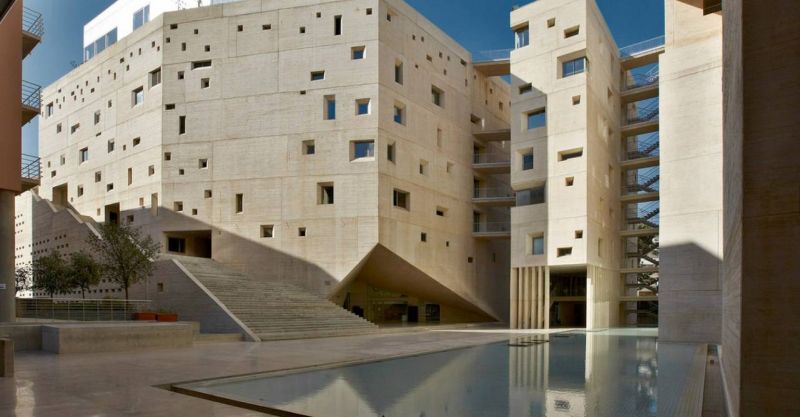
USJ Campus of Innovation and Sports on Damascus Street, Beirut. (Credit: Eddy Dossantos)
On Tuesday, Banque Du Liban (BDL) officially changed the rate of “bank dollars” or “lollar” to LL15,000 on the dollar. This change came into effect Wednesday and directly affects university tuition fees
Cynthia Baz, a 2nd year computer science student at Notre Dame University (NDU) - Louaize, believes the university’s decision to adopt the new rate is understandable given the economic instability affecting the country. She added, however, that the impact of this decision will weigh heavily on the shoulders of students like herself and could disrupt their plans for the future.
“The university’s announcement is abrupt. We are really stunned,” said an NDU audio-visual student who asked to remain anonymous. “We can't judge if this decision is good or bad.”
The student acknowledged that NDU administration supports students through its financial aid office. He expressed his understanding of the university’s need to cover its expenses and added that he is “aware that tuition here is among the cheapest in the country.”
Georges Rouhana, student representative of the Business School at the Holy Spirit University of Kaslik (USEK) opposes the decision, which was made on a short notice before the registration deadline for the spring semester.
He acknowledged that this decision was not a surprise, indicating that the USEK administration warned students from the beginning of the economic crisis that it would comply with BDL’s decisions.
USEK’s Deputy President for Student Affairs, Celine Baaklini, justified the university’s decision. She said the institution has been committed to standing by its students and cited its refusal to charge tuition fees according to the parallel market rate, instead opting for the former official rate of LL1,507.5 to the dollar.
“However, this rate has become a far-fetched dream for the past three years,” Baaklini said.
She explained the change was not a last-minute decision. The university took the time to examine it in detail and consider an action plan in collaboration with the student representative committee to help students in distress.
According to USEK administration, students currently pay 80 percent of their tuition fees in lira and 20 percent in fresh dollars. Students can apply for financial aid covering up to 50 percent of the lira portion and a loan to cover up to 50 percent of the dollarized portion.
Confusion and major frustration
For its part, the USEK Secular Club said it considers the administration’s decision to adapt to the new BDL rate a great failure. It argues that a large number of students receive their salaries at LL1,507.5 rate and that the administration's decision, which was made in the middle of the academic year, was too sudden.
The club also issued a statement blaming the ruling political parties for not offering solutions to help students pay their tuition.
“It saddens me so much that students are working on plans B and C to continue their studies,” said Sarah Ibrahim, 19, a student of law at Saint Joseph University (USJ) who sees the decision as a double-edged sword.
“Professors should be paid fairly,” she said, while also denouncing the fact that not all students can afford the new rates. “The only way for students to continue their education, in my opinion, is through higher financial aid.”
“I hope that [the university] will invest the money in the right place,” said a fourth-year law student at USJ who also asked to remain anonymous. He pointed to all the sacrifices parents in Lebanon are willing to make just to cover their children’s tuition fees.
For this student, there are only two paths forward: start over by changing universities or accept the new reality.
“The situation is confusing for me,” he said. “I’m stuck in my last year, I can’t change anything. There’s no way back.”
This article was originally published in French on L'Orient Le-Jour. Translation by Joelle El Khoury.
